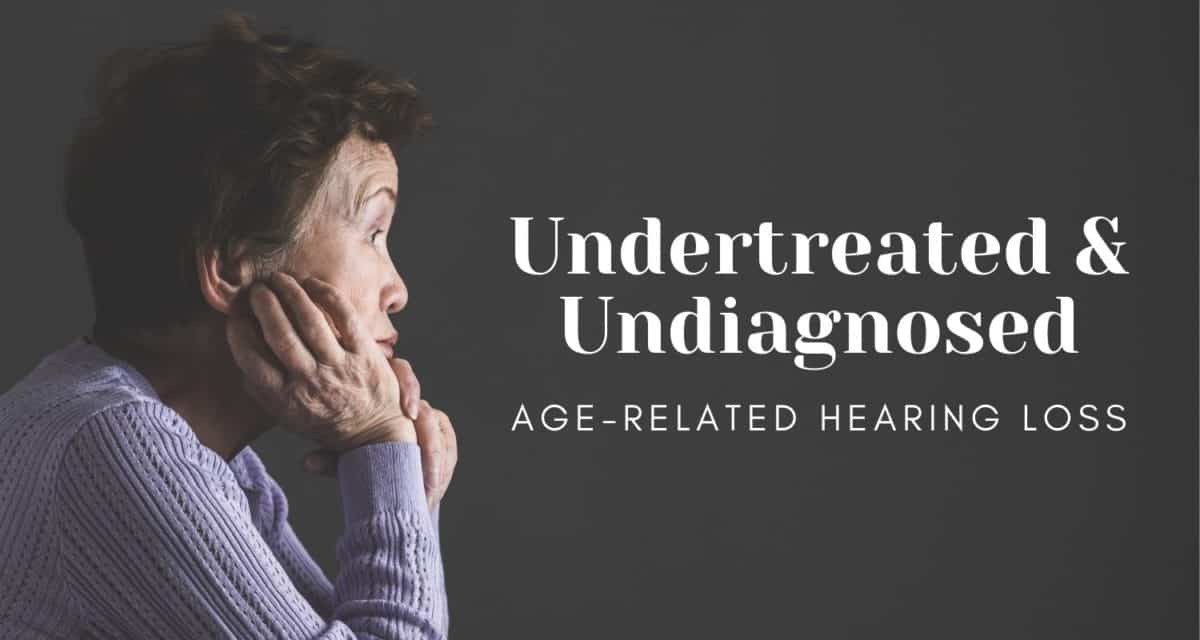Your Phonak hearing aid at unbeatable prices!

Undertreated & Undiagnosed: Age-Related Hearing Loss
Age-related hearing loss is an unfortunate fact of life that we must all live with. While age-related hearing loss has started to begin later in life than it has for generations—likely due to greater care in avoiding noise exposure—it still occurs at some point.
Hearing Loss Is a Lifelong Process
We lose hearing slowly throughout our lives. While a child can usually hear sounds up to 20 kHz (the highest pitches that human hearing can pick up), most of us lose this highest range of hearing by the time we reach age 30, and often much earlier.
What we call “age-related hearing loss” (or presbycusis) can begin as early as age 45, though most often starts in our 50s. Of those aged 60–69, about one-third have a degree of hearing loss that should be treated with hearing aids. About two-thirds of those aged 70 and up should wear hearing aids. About 100% of centenarians have hearing loss. It’s really true that all we need to do is live long enough and we will all experience hearing loss at some point!
Hearing Loss Brings Negative Consequences
Because hearing loss is something that happens to everyone, it is a well-studied phenomenon. We don’t know everything about hearing loss, but we learn more every year. The World Health Organization has listed hearing loss as the #1 modifiable risk factor in the development of Alzheimer’s disease, out of 12. Hearing loss is known to start off a cascade of negative outcomes for health and well-being, including depression, loneliness, social isolation, increased risk of physical injury, decreased physical activity, and more.
Even mild hearing loss causes us great difficulty with understanding speech in noisy environments. This, in turn, requires increased listening effort, which leads to fatigue and exhaustion. Those with mild hearing loss also report having more memory issues than those with normal hearing or who treat their hearing loss with hearing aids.
Hearing Loss Is Undertreated
In spite of all this knowledge about the effects that hearing loss can have on our lifestyle, health, and sense of well-being, the statistics around treatment have not changed in over 40 years. Of those who need hearing aids, only about 1 out of 5 ever gets them. What’s more, those who do get them tend to wait an average of 7 years after realizing they’re having hearing issues.
This is unfortunate. Hearing loss not only causes changes in our lifestyle but changes in our brain. When we can’t hear, the auditory cortex in our brain is underused, and actually starts to collapse. It’s not that the brain cells die, but the gray matter between them dissipates and the whole structure shrinks. When we finally get hearing aids, we may have regained the ability to hear speech, but we have lost the ability to understand it. It can take months or years of training to relearn how to comprehend speech.
When hearing loss sets in, it should be treated with hearing aids as soon as possible. This allows our hearing ability to be uninterrupted by hearing loss. It prevents unfortunate changes in our brain and changes in our life from taking place that will be hard to undo as time goes on.
How Do We Know When It’s Time For Hearing Aids?
Usually, someone else tells us we have hearing loss before we notice it ourselves. If someone in your life has pointed out that you may not be hearing as well as you used to, chances are they’re right.
The best way to ensure that hearing loss doesn’t come to dominate your life is to get your hearing tested regularly. It is recommended to get a hearing test once every decade until age 50, and once every three years after that. Those in high-risk professions or with a medical history indicating a higher risk for hearing loss should be tested even more frequently. Regular hearing tests are the best way to take charge of your hearing health and make sure you receive the hearing amplification—or protection—that is needed for you to hear your best.
If you or a loved one may be having hearing issues—or if you’re due for a hearing test—make an appointment today and start keeping track of your hearing health over time. Your ears, and your brain, will thank you!
